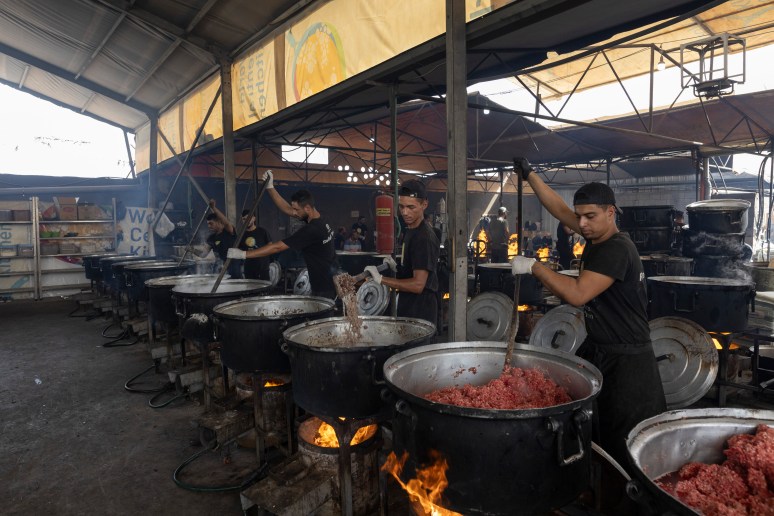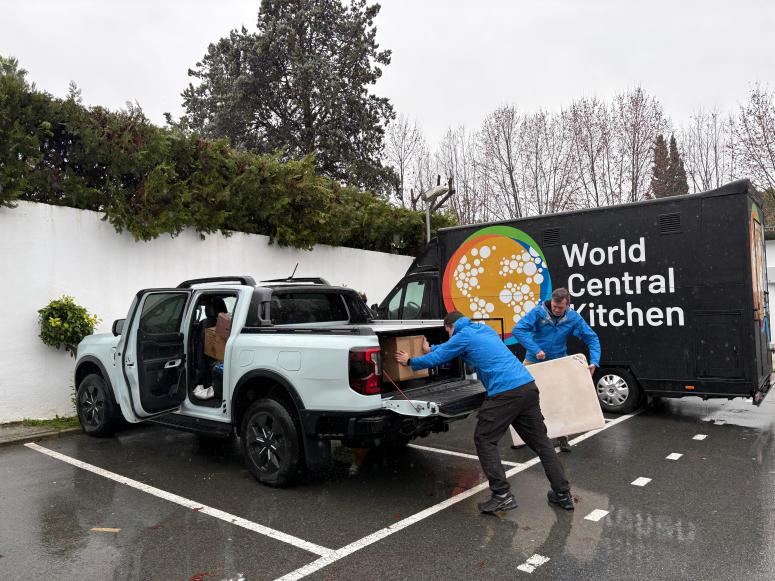WCK prepares to support Ukrainians through harsh winter

With temperatures beginning to dip below freezing across Ukraine, it’s clear that winter is coming. As Russia’s relentless attacks on energy and water systems continue, countless Ukrainians are headed into the coldest months of the year unsure of whether they’ll have access to heat and other utilities. The closer winter gets, the more difficult conditions become.
Russian attacks have damaged an estimated 40% of Ukraine’s power grid. The impact is being felt in cities like Kyiv where power was restored in recent months. Still, rolling power outages are common as authorities work to repair as much of the damaged grid as possible ahead of winter. More than 4.5 million people are already without power as a result of these rolling blackouts.
WCK arrived in Ukraine just days after Russia’s invasion in February. In those first months of the war, our team witnessed the suffering of families that fled for their lives in freezing temperatures. Immediately following the invasion, a majority of refugees fled to Poland, crossing the border at all hours of the night in freezing cold temperatures.

Now, heading into the first full winter of the war, we are directing our efforts to support communities without electricity, heat, and other basic infrastructure.

It’s going to be a brutal winter. I was here already in February, March. Even in April it was snowing, it was freezing cold. Without electricity, without heat, we are going to have hundreds of thousands, if not millions, that they are going to suffer.
José Andrés
Not only are families unable to heat their homes, many are unable to repair windows and roofs damaged during artillery and missile attacks. People are covering shattered windows with plastic bags and plywood, neither of which offer adequate protection from harsh winter conditions.
With the coldest, darkest days of winter fast approaching, the WCK team is making necessary arrangements to meet the food needs of families throughout the country, including in frontline and recently liberated regions.
WCK is supporting families that survived the horror of occupation by providing food kits and hot meals. The recently liberated city of Izyum in the Kharkiv region was devastated by the invasion. Shortly after the city returned under Ukrainian control, WCK established a Field Kitchen to prepare hot meals every day. Currently, our team has two mobile food distribution centers and is delivering door-to-door to people unable to reach the distribution points. Since mid-September, WCK has delivered more than 100,000 meals in Izyum where many people are so hungry that they start to eat as soon as they receive their meal.
Also in the Kharkiv region, the city of Kupiansk—split into two by the Oskil River—remains under partial occupation. Homes lack water, electricity, and gas and communication infrastructure does not work. Families send notes to communicate with loved ones in occupied areas. WCK delivers hot food every day that reaches households on both sides of the river.
As winter nears, our team will continue to support heavily damaged and newly liberated communities when possible, arriving quickly with sandwiches and hot meals.
Recent weeks have seen attacks on residential buildings intensify across Ukraine, forcing families to move further and further away from their hometowns. On October 10, Russia launched dozens of missiles that targeted civilian areas and essential infrastructure across Ukraine. Blasts were reported in eight regions in what became one of the most intense strikes since the first days of the invasion. WCK partners immediately jumped in and started preparing meals for first responders and residents of affected communities.
Our team also stepped in to help Ukrainian Railways after power outages caused by the blasts left passengers stranded at stations past local curfews. WCK served thousands of sandwiches, along with hot coffee and tea, to people left with no choice but to spend the night at rail stations.
The movement of people away from frontline communities is expected to continue into the winter. As a result, WCK will support families on the move in eastern Ukraine, offering spaces for people to warm up and eat a hot bowl of soup or stew. We will also be serving hot tea and coffee wherever possible.
In addition to attacks on residential neighborhoods, Russia has begun targeting vital infrastructure. In late September, Russia launched a massive rocket attack on Dnipro in central Ukraine. One of the projectiles hit a bus depot, destroying more than 100 buses and leaving people without much-needed transport. Another rocket hit a residential building, killing at least four civilians, including two children. Our team arrived as soon as it was safe to do so to provide meals for residents and first responders conducting search and rescue operations.
In Dnipro, our team met Yevgeniya and Oleg. The siblings fled fighting near their home in Slavyansk and came to Dnipro where until recently they lived in a shelter. Following the attack, they were forced to move farther across Ukraine in search of safety.

In southern Ukraine, WCK is supporting recently liberated communities and others that are facing near daily bombardment. In October, responding to the needs of people around Kherson—a region where intense fighting is expected to continue—WCK reached 32 liberated communities to deliver more than 9,000 food kits. Most families in this region have spent months without electricity, water, or gas.
Communities in nearby Mykolaiv have been the target of persistent shelling for months. WCK is delivering 13,000 food kits each week to residents of the region. We are also providing hot lunches to families unable to cook for themselves. Our team has gotten within three miles of the front line in this region to deliver hundreds of food kits in areas where other humanitarian aid does not reach.

Many displaced people from Kherson and Mykolaiv fled to Odesa as attacks intensified. There, WCK is supporting a shelter which has taken in families who lost their homes to Russian attacks. Valentyna is one of the shelter’s wartime residents. Having lived most of her life in villages throughout Kherson and Mykolaiv, she was forced to flee after a rocket blast left her deaf in one ear and nursing a leg injury. Shockwaves from the strike shattered the doors and windows of her home. After finding out that her son had been killed in combat, Valentyna and her granddaughter made their way to Odesa.

It is so scary, scary when the walls of your house are shaking. Who would have thought that they would start targeting civilians?
Valentyna
Damaged roads into recently liberated communities are adding an extra challenge to humanitarian efforts. In order to deliver much-needed food to families in Studenok and Arkhangelske—two villages left isolated after blasts destroyed bridges—our team loaded small boats with hundreds of food kits to deliver to residents in each of the communities. The situation in villages like these is dire. People live in unheated basements and rely on wood-burning stoves to cook.
Our team—consisting of Ukranians feeding Ukranians—is preparing for what will undoubtedly be a harsh winter. Ever increasing shelling and unrelenting weather conditions will mean countless families face a daunting challenge.

When we come to people who don’t have anything left, with a plate of hot, fresh food, they see that there is someone that can take care of them. That there is someone who cares.
Yuliia
WCK Media & Translation Lead in Ukraine
WCK is putting elements in place that will bring some hope and comfort to communities in need. We will continue to provide nourishing meals to frontline and recently liberated regions, to communities that lack basic infrastructure for heating and electricity, and will establish meal distribution centers so families fleeing the conflict can warm up while they eat a hot plate of food. We need support to continue this critical work—donate here.




















